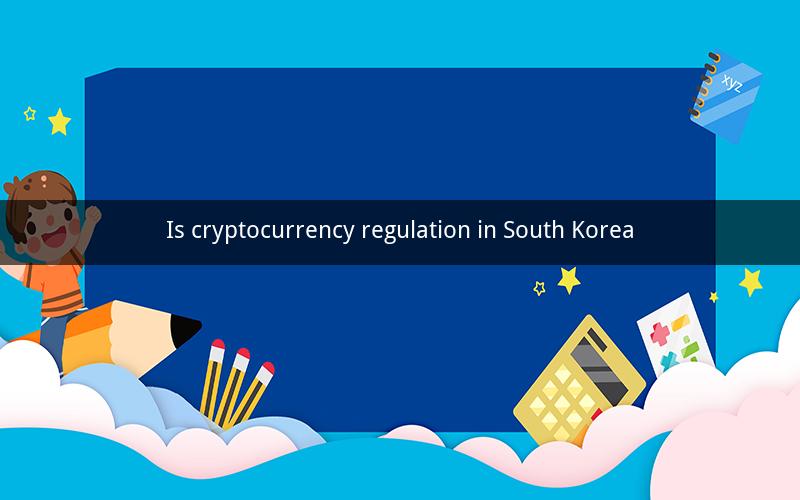
Cryptocurrency Regulation in South Korea: An In-Depth Analysis
Table of Contents
1. Introduction to Cryptocurrency Regulation in South Korea
2. Historical Background of Cryptocurrency Regulation
3. Current Regulatory Landscape
4. Impact of Regulation on Cryptocurrency Exchanges
5. Government Initiatives and Policies
6. Public Perception and Market Reactions
7. International Comparison
8. Future Prospects and Challenges
9. Conclusion
1. Introduction to Cryptocurrency Regulation in South Korea
South Korea has been at the forefront of the global cryptocurrency market, with a significant number of crypto enthusiasts and investors. However, the rapid growth of the industry has led to concerns regarding investor protection, market stability, and potential financial crimes. As a result, the South Korean government has implemented various regulations to govern the cryptocurrency sector.
2. Historical Background of Cryptocurrency Regulation
The journey of cryptocurrency regulation in South Korea began in 2017 when the government imposed strict regulations on initial coin offerings (ICOs) to prevent illegal fundraising and speculative trading. Since then, the regulatory framework has evolved, aiming to strike a balance between fostering innovation and ensuring market stability.
3. Current Regulatory Landscape
3.1 Cryptocurrency Exchanges
South Korea has some of the largest cryptocurrency exchanges in the world, such as Upbit, Bithumb, and Coinone. The government has implemented several regulations to regulate these exchanges, including:
- Mandatory registration and licensing for all cryptocurrency exchanges.
- Enhanced Know Your Customer (KYC) and Anti-Money Laundering (AML) procedures.
- Restrictions on margin trading and leverage to mitigate risks.
3.2 ICOs and Cryptocurrency Tokens
The South Korean government has imposed strict regulations on ICOs, making it difficult for new projects to raise funds domestically. The regulations include:
- Prohibition of ICOs in South Korea.
- A ban on the marketing and distribution of ICO tokens to South Korean citizens.
- Stringent requirements for foreign ICOs to operate legally in the country.
4. Impact of Regulation on Cryptocurrency Exchanges
The implementation of regulations has had both positive and negative impacts on cryptocurrency exchanges in South Korea. On one hand, it has improved investor protection and reduced the risk of financial crimes. On the other hand, it has led to increased operational costs and limited the growth potential of exchanges.
5. Government Initiatives and Policies
The South Korean government has taken several initiatives to promote the development of the cryptocurrency industry while addressing its concerns. These include:
- The establishment of a dedicated regulatory authority for cryptocurrency.
- Collaboration with international organizations to enhance global regulatory standards.
- Development of a digital asset exchange platform to facilitate secure and transparent transactions.
6. Public Perception and Market Reactions
Public perception of cryptocurrency regulation in South Korea has been mixed. While some believe that the regulations are necessary to protect investors, others argue that they hinder innovation and growth. The market has reacted to these regulations with fluctuations in prices and trading volumes.
7. International Comparison
South Korea's approach to cryptocurrency regulation is unique compared to other countries. While some countries have imposed strict bans on cryptocurrencies, South Korea has adopted a more balanced approach, aiming to regulate the industry while allowing innovation to thrive.
8. Future Prospects and Challenges
The future of cryptocurrency regulation in South Korea depends on various factors, including global market trends, technological advancements, and the government's willingness to adapt to new challenges. Some potential challenges include:
- Balancing innovation with market stability.
- Keeping up with rapidly evolving technology.
- Addressing concerns related to financial crimes and tax evasion.
9. Conclusion
Cryptocurrency regulation in South Korea has been a complex and evolving process. While the government has taken significant steps to regulate the industry, challenges remain. As the cryptocurrency market continues to grow, it is crucial for South Korea to adapt its regulatory framework to ensure market stability and foster innovation.
---
Questions and Answers
1. What are the main reasons behind the South Korean government's decision to regulate the cryptocurrency market?
- The main reasons include investor protection, market stability, and prevention of financial crimes.
2. How has the implementation of regulations affected cryptocurrency exchanges in South Korea?
- The implementation has led to increased operational costs and limited growth potential for exchanges, but also improved investor protection.
3. What are the key differences between South Korea's approach to cryptocurrency regulation and that of other countries?
- South Korea's approach is more balanced, focusing on regulation while allowing innovation, unlike countries with stricter bans.
4. How have public perceptions of cryptocurrency regulation in South Korea changed over time?
- Public perceptions have been mixed, with some supporting the regulations for investor protection and others opposing them for hindering innovation.
5. What are some of the challenges South Korea faces in regulating the cryptocurrency market?
- Challenges include balancing innovation with market stability, keeping up with technological advancements, and addressing financial crimes.
6. How do the regulations on ICOs in South Korea compare to those in other countries?
- South Korea has one of the strictest approaches to ICOs, with a complete ban on domestic ICOs and marketing restrictions.
7. What are the potential long-term effects of cryptocurrency regulation in South Korea on the global market?
- The potential effects include setting a precedent for other countries and influencing the development of the global cryptocurrency industry.
8. How do South Korea's regulatory measures affect the global reputation of its cryptocurrency exchanges?
- The measures have improved the reputation of South Korean exchanges by enhancing investor confidence and reducing the risk of financial crimes.
9. What role do international organizations play in shaping cryptocurrency regulation in South Korea?
- International organizations help South Korea align its regulations with global standards and collaborate on cross-border issues.
10. How can South Korea ensure that its cryptocurrency regulations do not stifle innovation while protecting investors?
- South Korea can achieve this by continuously reviewing and updating its regulations, fostering dialogue between regulators and industry stakeholders, and embracing technological advancements.